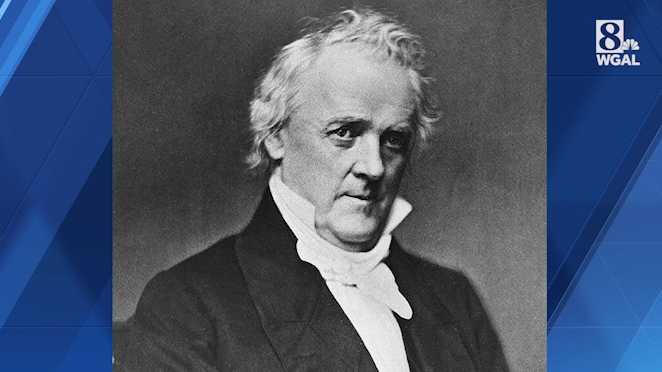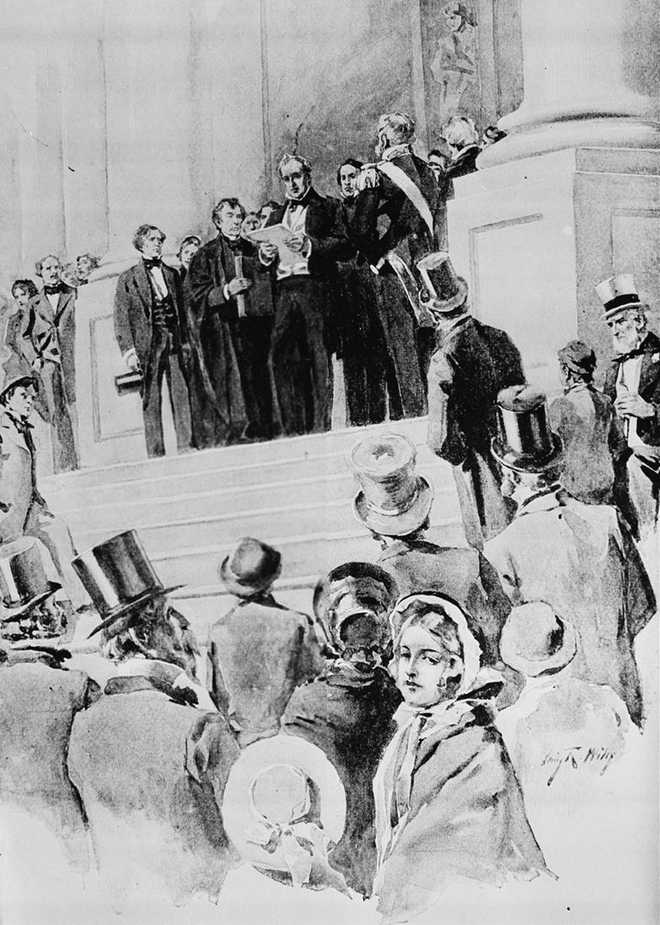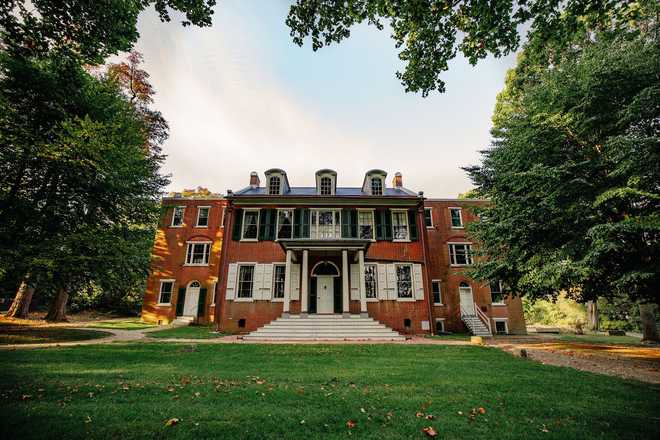James Buchanan is the only U.S. president from the Susquehanna Valley.He was born and raised in Franklin County, and he lived in Lancaster for most of his adult life.News 8 went to LancasterHistory for a timeline of his life.April 23, 1791 | James Buchanan Jr. was born in Cove Gap, Franklin County.1791-1807 | Buchanan was raised by his father – a businessman, merchant and farmer – and his mother. While he received classic schooling in Mercersburg, the informal lessons he received from his mother may have been more formative.1807-1809 | Buchanan enrolled in Dickinson College. He was expelled for disorderly conduct but his scholarship and social standing were solid enough that he still earned a diploma.1809-1812 | Buchanan went to Lancaster to study the law with an established lawyer. He was admitted to the bar after an oral exam. Soon after, he had a thriving law practice.1814 | After the British invaded Baltimore, he enlisted as a private in a local militia company of volunteer cavalry. His unit served in defense of Baltimore.1814-1816 | Buchanan served in the Pennsylvania House of Representatives.1821-1831 | He was a member of the U.S. House of Representatives during the administrations of James Monroe, John Quincy Adams and Andrew Jackson.1832-1833 | After losing the position of attorney general, Buchanan was offered a post in Russia. He was one of the most successful diplomats of the Jacksonian era.1834-1845 | When he returned from Russia, he was elected to the U.S. Senate. He won reelection two more times. During his time as a senator, he opposed the Second Bank of the United States, supported states’ rights and argued for the annexation of Texas and the Oregon Territory.1845-1849 | Buchanan served as secretary of state under James Polk. This came at a time of great national expansion, with the U.S. nearly doubling in size during Polk’s term.1848 | Buchanan purchased Wheatland. He lived there with his niece Harriet Lane, nephew James Buchanan “Buck” Henry, and family housekeeper Esther “Hetty” Parker.1852-1866 | He served as president of the Franklin & Marshall College board for 14 years after he helped negotiate the merger of Franklin College and Marshall College.1853-1856 | Buchanan was the ambassador to the United Kingdom under Franklin Pierce.June 1856 | Buchanan was viewed as a “compromise candidate” when he was nominated as presidential candidate during the Democratic National Convention. He promised not to add or detract from the official platform, which emphasized non-intervention on slavery in the territories.November 1856 | Buchanan was elected the 15th president.March 4, 1857 | In his inaugural speech, Buchanan said he would try to end the “agitation” over slavery. He told Americans that the Supreme Court would soon settle the issue. He also promised not to run for reelection.March 4, 1857-March 4, 1861 | Hopes were high that Buchanan could unify the deeply divided country and avert a national crisis. However, he failed to understand the political realities of the time. Near the end of his term, he adopted a policy of inactivity. This left his successor to contend with the major issues.1861 | After a public service career spanning almost five decades, Buchanan retired to Wheatland.1866 | He faced blame for the Civil War and wanted to defend himself, so he became the first American president to publish his memoirs. He wrote Mr. Buchanan’s Administration on the Eve of the Rebellion, which is his fullest public defense.May 30, 1868 | He gave his last public statement from his bed: “My dear friend, I have no fear for the future. Posterity will do me justice. I have always felt, and still feel that I discharged every public duty imposed upon me conscientiously. I have no regret for any public act of my life and history will vindicate my memory from every unjust aspersion.”June 1, 1868 | Buchanan died at the age of 77 from respiratory failure. Thousands came to pay their respects and observe the funeral procession to Woodward Hill Cemetery.
James Buchanan is the only U.S. president from the Susquehanna Valley.
He was born and raised in Franklin County, and he lived in Lancaster for most of his adult life.
News 8 went to LancasterHistory for a timeline of his life.
April 23, 1791 | James Buchanan Jr. was born in Cove Gap, Franklin County.
1791-1807 | Buchanan was raised by his father – a businessman, merchant and farmer – and his mother. While he received classic schooling in Mercersburg, the informal lessons he received from his mother may have been more formative.
1807-1809 | Buchanan enrolled in Dickinson College. He was expelled for disorderly conduct but his scholarship and social standing were solid enough that he still earned a diploma.
1809-1812 | Buchanan went to Lancaster to study the law with an established lawyer. He was admitted to the bar after an oral exam. Soon after, he had a thriving law practice.
1814 | After the British invaded Baltimore, he enlisted as a private in a local militia company of volunteer cavalry. His unit served in defense of Baltimore.
1814-1816 | Buchanan served in the Pennsylvania House of Representatives.
1821-1831 | He was a member of the U.S. House of Representatives during the administrations of James Monroe, John Quincy Adams and Andrew Jackson.
1832-1833 | After losing the position of attorney general, Buchanan was offered a post in Russia. He was one of the most successful diplomats of the Jacksonian era.
1834-1845 | When he returned from Russia, he was elected to the U.S. Senate. He won reelection two more times. During his time as a senator, he opposed the Second Bank of the United States, supported states’ rights and argued for the annexation of Texas and the Oregon Territory.
1845-1849 | Buchanan served as secretary of state under James Polk. This came at a time of great national expansion, with the U.S. nearly doubling in size during Polk’s term.
1848 | Buchanan purchased Wheatland. He lived there with his niece Harriet Lane, nephew James Buchanan “Buck” Henry, and family housekeeper Esther “Hetty” Parker.
1852-1866 | He served as president of the Franklin & Marshall College board for 14 years after he helped negotiate the merger of Franklin College and Marshall College.
1853-1856 | Buchanan was the ambassador to the United Kingdom under Franklin Pierce.
June 1856 | Buchanan was viewed as a “compromise candidate” when he was nominated as presidential candidate during the Democratic National Convention. He promised not to add or detract from the official platform, which emphasized non-intervention on slavery in the territories.
November 1856 | Buchanan was elected the 15th president.
March 4, 1857 | In his inaugural speech, Buchanan said he would try to end the “agitation” over slavery. He told Americans that the Supreme Court would soon settle the issue. He also promised not to run for reelection.
March 4, 1857-March 4, 1861 | Hopes were high that Buchanan could unify the deeply divided country and avert a national crisis. However, he failed to understand the political realities of the time. Near the end of his term, he adopted a policy of inactivity. This left his successor to contend with the major issues.
1861 | After a public service career spanning almost five decades, Buchanan retired to Wheatland.
1866 | He faced blame for the Civil War and wanted to defend himself, so he became the first American president to publish his memoirs. He wrote Mr. Buchanan’s Administration on the Eve of the Rebellion, which is his fullest public defense.
May 30, 1868 | He gave his last public statement from his bed: “My dear friend, I have no fear for the future. Posterity will do me justice. I have always felt, and still feel that I discharged every public duty imposed upon me conscientiously. I have no regret for any public act of my life and history will vindicate my memory from every unjust aspersion.”
June 1, 1868 | Buchanan died at the age of 77 from respiratory failure. Thousands came to pay their respects and observe the funeral procession to Woodward Hill Cemetery.


